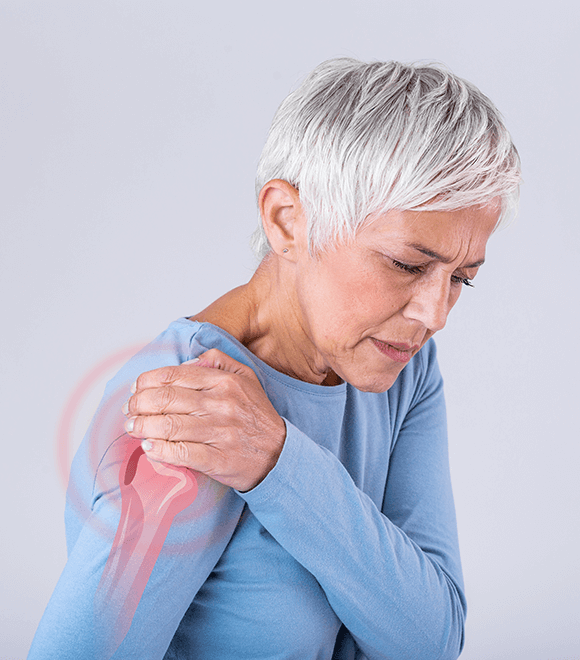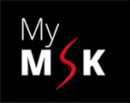Frozen Shoulder
Frozen Shoulder
Frozen Shoulder is a commonly used phrase to explain what in the medical literature is referred to as Adhesive Capsulitis
This is essentially a progressive thickening of the joint capsule which leads to pain, stiffness and restriction of movement in the affected shoulder.
The age group most commonly affected is 40-60 years of age and it seems to occur more in females than males
It often starts as a dull pain around the shoulder. This gets worse with pain spreading below the elbow of the affected shoulder over a period of months
Often sleeping on the affected side can cause severe pain and sleep is frequently disturbed.
Everyday tasks such as putting on a coat or shirt also become difficult and you find yourself struggling to even reach out for objects in front of you such as reaching for items on a shelf

Causes Of Frozen Shoulder
- Trauma: Can follow a traumatic event e.g injuring or straining the Rotator Cuff Muscles. Over time this may cause the shoulder to stiffen. Alternatively the shoulder may be in a temporary sling following an injury or fracture to the shoulder or clavicle. This can cause the shoulder capsule to ‘stiffen’ and a progression to Frozen Shoulder
- Post-Surgery is also a risk factor where the shoulder is immobilised for a long period post surgery.
- Diabetes and an Thyroid problems are also linked to this condition and we advise patients to have their bloods checked for these conditions especially when over the age of 35. In these patients the ‘good shoulder’-the other side, can also become frozen in time.
- Post – Heart Attack/Stroke. Again, probably due to the patient not mobilising the shoulder following the event. Frozen shoulder is present in many patients following a heart attack or stroke. In stroke one side of the body is often paralysed and this ‘stiffening’ of the body often results in frozen shoulder.
- TB
- Cervical Disc Prolapse: A slipped disc/cervical disc prolapse in the neck often presents as shoulder pain as the first complaint. Several nerves in the neck supply shoulder muscles (C4-C6) and when these nerve are trapped they can cause pins and needles or a burning pain in the shoulder area.
Tests for Frozen Shoulder
Test 1
Keep your elbow tucked in to your side (be strict with this) and try and swing your hand out to the side at the same time. If there’s a big difference between the range of movement between the two sides then try test 2
Test 2
Stand against a wall with your painless side and raise the hand of the painful side as high as you can. Again if you struggle with this test along with the test 1 it further raises the possibility of frozen shoulder.
Test 3
Reach behind your back (ideally between the shoulder blades) with the hand of your painless side (use a mirror for this test if you can). Then compare this with the other hand. If the hand from the painful side does not go as high between the shoulder blades as the painless side or you struggle to do this movement and the other two tests are positive then there’s strong possibility you have frozen shoulder/adhesive capsulitis. Our advice is consult with an experienced clinician promptly to avoid the debilitating effects of this painful condition.
Frozen Shoulder Investigations
XRAY: An X-ray of the shoulder is advisable to check for any underlying bone problems or calcification which may cause frozen shoulder to develop. Often an ultrasound scan or a thorough clinical examination can diagnose Frozen Shoulder
An Ultrasound scan is advisable to try and detect muscle or tendon problems which may have led to the Frozen Shoulder. If a muscle or tendon problem is detected by this method, it makes it easier to address and prevent recurrence of frozen shoulder which is common.
In this situation the Frozen Shoulder can be treated first to prevent or reduce the 18-24 months it can take for this condition to resolve by itself. The damaged tendon can also be treated using a combination of prolotherapy or PRP combined with physiotherapy

Early treatment of Frozen Shoulder is essential for a quicker recovery otherwise this stubborn condition can take 1-3 yrs or even longer to resolve. This can have a significant affect on a persons activities of daily living. Frozen shoulder often disturbs sleep and quality of daily activities. Remember the shoulder is the most mobile joint in the body and also probably the most used joint in day to day activities
The good news is in nearly all cases it does get better eventually with treatment.
There are typically 3 phases of Frozen Shoulder:
3 Phases of Frozen Shoulder

Freezing Stage (6-10 months)
- You start to develop pain (predominant symptom) in your shoulder. It is initially felt over the area of the deltoid but may extend to the base of the neck. Often this can be misdiagnosed as neck pain by the doctor and you are given paracetamol/naproxen/amitryptilline/gabapentin
- This can last anywhere from 6 to 10 months. Because shoulder stiffness is not that common at this stage most patients do not seek treatment. If treated at this stage, it may be possible to halt the progression of this condition. We call this the ‘window of opportunity’ because the right treatment at this stage can make all the difference in terms of recovery

Frozen Stage (5-12 months)
- Pain and stiffness are key features.
- Sleep is often affected and the pain is constant. The patient usually cannot sleep on that side at night.
- Often we notice a ‘full lock’ on the affected side. The patient struggles to move the shoulder in any direction and this leads to pain in the neck area and pain running down the arm and elbow

Thawing Stage (6m-2 years)
- Range of motion starts to go back to normal. The pain although present is settling. There is still some stiffness but better than before
- This can take anywhere from 6m to 2 years
- The good new is you are on the way to recovery and less pain. Often the restriction in mobility/movement of the shoulder takes time to improve

Frozen Shoulder Treatment
- Painkillers: Usually painkillers to reduce the pain and allow physical exercises to start
- Soft tissue therapy with a Physiotherapist/Osteopath/Sports therapist can really aid recovery
- Steroid injections Cortisone injections (Frozen Shoulder Injection) repeated over several weeks are a safe treatment for this condition. We can also utilise Prolotherapy for this condition
- Hydrodilatation: A procedure where a large volume of Saline is injected into the joint capsule to dilate to and separate the capsule which may be thickened or stuck together. This usually done under Ultrasound Guidance.
- Physio Exercises
- Surgery-Manipulation under General Anaesthetic. This is usually a drastic measure when other measures fail but we often find patients have not utilised physio or injections fully before being listed for this procedure. Often the patient has to be put to sleep under General Anaesthetic. This really is the last course of treatment where frozen shoulder has progressed to a stage where nothing is working
- Shoulder Arthroscopic Surgery: a small minority of cases to loosen the joint capsule
Think you have Frozen Shoulder?
Our Treatments for Frozen Shoulder

Hyaluronic Acid
At MyMSK Clinic, we tend to offer Hyaluronic Acid injections(Durolane or Ostenil Plus) for Joint Pain and Osteoarthritis.
Explore More
Cortisone Injections
A Cortisone Injection (termed steroid injection in the UK) is an anti inflammatory injection for the joints or body tissue to relieve pain.
Explore More
Platelet Rich Plasma
PRP treatment can reduce the need for anti-inflammatory medication or strong painkillers with unwanted side effects
Explore More
Prolotherapy
A regenerative treatment for chronic painful joints and ligaments which involves the injection of a specially formulated solution into damaged tissue.
Explore More
Joint Injections
Combined with rehab program, joint injection treatments at MyMSK Clinic show exciting and promising results
Explore MoreThink you have Frozen Shoulder?
Contact us
We’d love to hear from you!
Just reach out and contact us via any of
these channels:

Call us on

Email us on

Call us on





